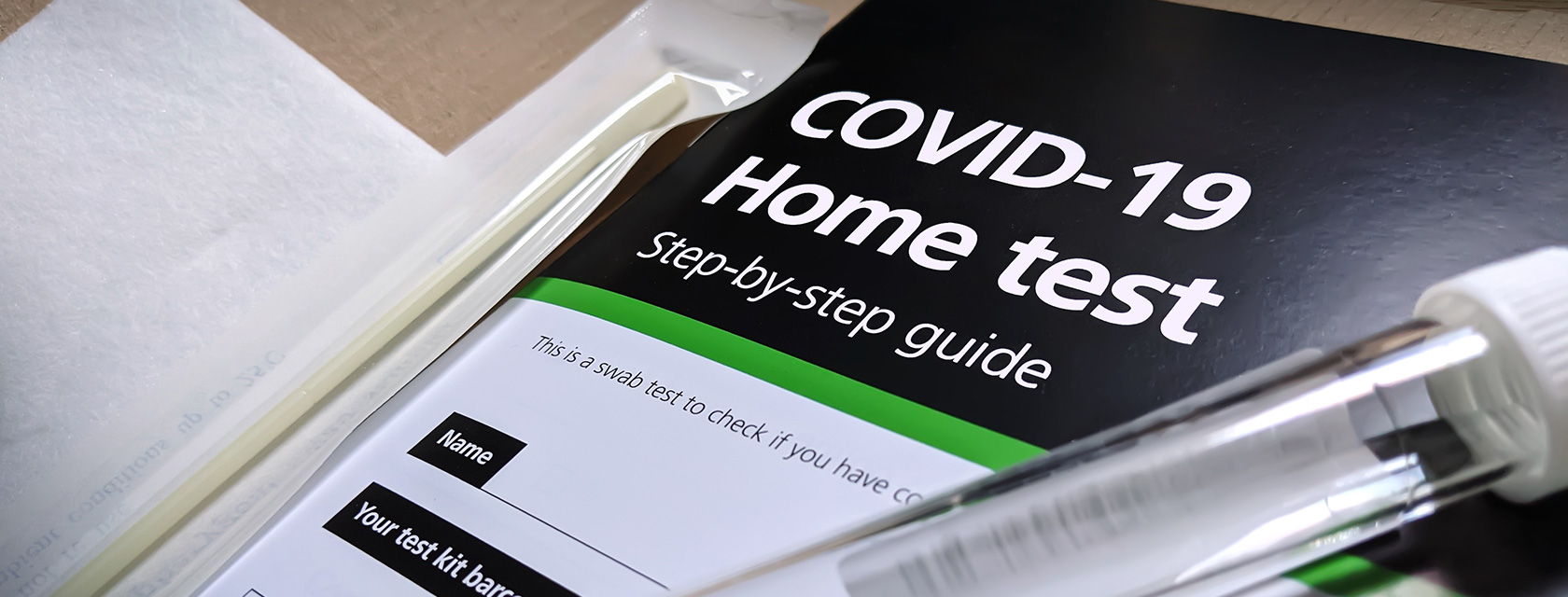
A new study by researchers at Dartmouth, Carnegie Mellon University, the University of Pittsburgh, and the Lisa Schwartz Foundation for Truth in Medicine, published this week in JAMA Internal Medicine, shows that people using COVID home test kits may fail to self-quarantine or may quarantine unnecessarily because they misinterpret the implications of test results.
The U.S. Food and Drug Administration (FDA) has prioritized home testing for SARS-CoV-2 for individuals with or without symptoms, issuing authorizations for eleven rapid at-home self-testing kits (as of December 2021). As part of this effort, in mid-January the Biden Administration began distributing the first (of a planned 500 million) free at-home COVID-19 tests to the public through its new website.
But how appropriately consumers interpret and act on the results of at-home COVID-19 self-tests is unknown.
To make this assessment, the researchers conducted a randomized clinical trial with 360 adults in the U.S. who were recruited in April 2021 to complete an online survey on their interpretation of hypothetical at-home COVID-19 self-test results. Data analyses of the trial were performed from June to July 2021.
The study participants were given either the FDA “authorized instructions,” “intervention instructions” developed and pre-tested by the researchers and based on behavioral decision research principles, or no instructions (control group).
Participants were asked to interpret results from one of four possible scenarios, three of which were considered high risk and one considered low risk for infection: having typical COVID-19 symptoms and recent close contact with an individual infected with COVID-19; no COVID-19 symptoms and recent close contact; COVID-19 symptoms and no close contact; and no symptoms and no recent contact.
The researchers found that following a positive test result, the vast majority of participants appropriately said that they would follow the CDC’s quarantine recommendations, regardless of which instructions they had received.
But given a negative test result in the high-risk scenarios, a substantial proportion of participants said that they would not quarantine appropriately (as recommended by the CDC) with the authorized instructions. In the highest risk scenario (symptoms and close contact), for example, the proportion inappropriately failing to quarantine was higher with the authorized instructions (36 percent) than with the intervention (4 percent) or with no instructions (21 percent).
In the low-risk scenario, the proportion choosing unnecessary quarantine was also higher with the authorized instructions (31 percent) than with the intervention (22 percent) or control group (10 percent). In all groups in all scenarios, the proportion of incorrect responses was highest with the authorized instructions, even higher than with no instructions.
Although COVID-19 at-home test kits provide results within 30 minutes, they are less sensitive (have more false negatives) than polymerase chain reaction (PCR) tests, which have an estimated clinical sensitivity of 70 percent.
Therefore, users at high risk for infection (e.g., with symptoms and a known exposure) should still quarantine, even after receiving a negative test result. If users ignore that risk, a negative test result may falsely reassure them that there is no need to quarantine, and so potentially expose others to infection risk.

“Our findings suggest that many at-home COVID-19 self-test users will draw false reassurance from a negative result, ignoring conditions that pose a high risk of infection,” says lead author Steven Woloshin, MD, MS, a professor of medicine, community and family medicine, and of The Dartmouth Institute for Health Policy and Clinical Practice at the Geisel School of Medicine. “In other cases, they may quarantine unnecessarily because they misinterpret the implications of their test results.”
In the process of designing the intervention instructions, the researchers found that the CDC information was hard to follow, distributed across multiple webpages, poorly summarized, and not entirely consistent.
“I think our results show how fundamentally important it is to design and pilot-test instructions to ensure that they can be understood by as many users as possible—to increase the benefits and reduce the harms from at-home self-test kits,” says Woloshin.
“At-home test kits can play an important role in managing the COVID-19 pandemic,” he says, “but only if users interpret their results appropriately when deciding whether to quarantine.”
The study co-investigators were Barry Dewitt, PhD, Baruch Fischhoff, PhD (both at Carnegie Mellon University), and Tamar Krishnamurti, PhD (University of Pittsburgh).
"Medical experts often exaggerate how well they communicate with non-experts,” says Fischhoff, the Howard Heinz University Professor in the Department of Engineering & Public Policy and the Institute for Politics and Strategy. “As a result, they reduce the value of their creations and may even imperil users. Better communication is not expensive. However, it does require behavioral expertise and the humility to test communications before disseminating them.”
The research was funded by the Swedish Foundation for Social Sciences and Humanities, the Agency for Healthcare Research and Quality Comparative Health System Performance Initiative (grant No. 1U19HS024075), and the S&R Foundation's Kuno Award for Applied Science for the Social Good.
The Dartmouth Institute for Health Policy and Clinical Practice is a world leader in studying and advancing models for disruptive change in healthcare delivery. The work of Dartmouth Institute faculty and researchers includes developing the concept of shared decision-making between patients and healthcare professionals, creating the model for Accountable Care Organizations (ACOs), and introducing the game-changing concept that more healthcare is not necessarily better care.